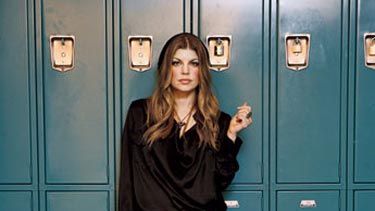Fergie's New Fight
Think you don't need to worry about AIDS? Reality check: Women make up more than 25 percent of new cases in the U.S. In a Marie Claire exclusive, Fergie tells how her own battles with drug addiction inspired her to help people with HIV.

Fergie wasn't always the "luckiest girl in the world," as she calls herself now. A decade ago, she was a paranoid crystal-meth addict. But she dug her way out, and now she's a rock star with a hottie fiancé — actor Josh Duhamel of Las Vegas — and a new gig as spokeswoman for the celebrated MAC Cosmetics "Viva Glam" campaign, which has raised more than $100 million to combat AIDS. In her first event for the beauty company, the petite 33-year-old, who gyrated her way to fame in the Black Eyed Peas before launching her solo album in 2006, led an intimate discussion with a handful of women at the Harlem United Community AIDS Center in New York City.
Fergie (a.k.a. Stacy Ann Ferguson) swooped into the center on 125th Street — Harlem's most bustling boulevard — looking casual in skinny black jeans and a knit cap. The women gathered round in an excited flurry, then sat down in a circle to exchange stories about drug addiction, rape, and AIDS — which is now the leading killer of African-American women ages 25 to 34, according to Nancy Mahon, senior vice president of MAC. All expressed gratitude to Harlem United. With its bright blue-and-orange walls lined with artwork by the members themselves, the center provides everything from medication to emotional support.
Fergie, moved to tears by the women's tales — including one from a teen named Caroline who contracted HIV after being pressured into sex — opened up about her own gritty history. "You're all sharing your stories, and I'm going to tell you mine," she said, wiping her eyes. "I was a child actor. I was this spaz kid diagnosed with ADHD, and I worked all the time. I got on a TV series, Kids Incorporated; I was like a little adult. And years later, because I would try to people-please, I would hold all these feelings in. Then, all of a sudden, I just didn't feel creative. And crystal meth came into my life."
Nods went around the room. "When I had that first hit, I knew I wanted to feel that way every day," Fergie said, studying the faces around her. "I went on a downward spiral. I lost friends, family. Anyone who disagreed with my way of life, I cut them out." She then fessed up that the money from her TV show had helped fund her habit. "But at some point, I spent it all. I started getting paranoid. I thought, The FBI is after me. I had about 20 different conspiracy theories," she laughed. "I painted the windows in my apartment black so 'they' couldn't see in."
Things went further downhill from there. "One day, when I was about 90 pounds, a guy comes up to me," Fergie said, lowering her voice. "I'm searching in the bushes for clues about whatever the FBI is after me for. I'm in some random getup — I think it was a cowboy hat and red lips — because I never knew if someone was taking my picture. He hands me a muffin. I'm thinking, He's in on it. Is there a message inside? So I tear it up. Looking back, I realize he assumed I was homeless."
The Harlem women smiled at this — they were seeing a decidedly unglamorous side of celebrity life. Fergie, perched on her armchair, continued. "A few weeks later, I'm at a farmer's market, when I hear church bells. I'd seen in some movie that they can't arrest you in a church, so I head straight to the nearest one. The attendants try to kick me out. Then I see a fire hydrant. I think, I can squirt them and run. But then I think, If you do this, you're going to
jail."
For Fergie, that was a defining moment. Frightened by her delusions, she called her therapist, then moved into her mom's house and joined a slew of support groups. "I started from zero," she said. "I feel lucky that I had a mom."
Get exclusive access to fashion and beauty trends, hot-off-the-press celebrity news, and more.
The room fell silent for a few seconds, as everyone digested what they'd heard, before the talk turned to healing. "It's all about that moment when you have to make a life change — and you find the strength. I understand that," Fergie said. When a woman with HIV named Lysa lamented that she has to rely heavily on her therapist on her darkest days, Fergie replied, "I call my therapist every other day. It's not a one-stop shop. You have to push away all that negativity in your head. Face it, name it, let it go." From the nods and knowing glances around the room, one thing was clear: Point taken.
For more information, see
macaidsfund.org.
Abigail Pesta is an award-winning investigative journalist who writes for major publications around the world. She is the author of The Girls: An All-American Town, a Predatory Doctor, and the Untold Story of the Gymnasts Who Brought Him Down.